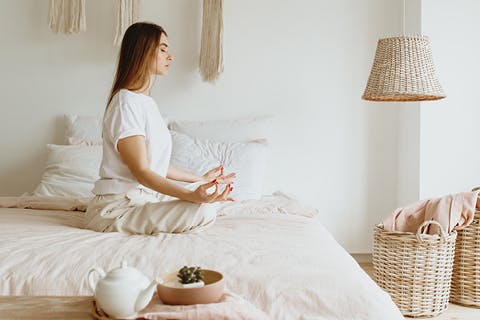How to Become a Morning Person

Are you longing to swap those late nights for an early start? Despite the benefits, getting up and out of bed can be a real challenge - especially if you’re not a morning person.
While there’s an appeal to staying in bed and not getting up until you have to, getting up early has plenty of benefits. Whether you want to catch a sunrise, fit in a workout before your busy day, or want a little bit of extra time to enjoy a coffee or breakfast, becoming an early bird doesn’t need to be a daily battle. Let’s explore how to get there if you’ve been struggling to make it in the mornings.

What makes someone a morning person?
Being a morning person has a lot to do with genetics, age and gender - all can dictate when we feel sleepy and naturally wake up. It’s known as our ‘biological clock’, and it influences when we sleep, and how alert we are at different times of the day.
While our bodies might want us to ‘burn the midnight oil’, there are certain things we can influence that will help us become morning people - like external factors and your bedtime routine.

Can you actually become a morning person?
You can become a morning person with certain lifestyle changes. Like any change, it’s best to start gradually as you’re more likely to stick to it - your body will appreciate the time to get used to your new schedule, too!
Going against your natural rhythms can be challenging, so embracing a growth mindset will help you make the change. Instead of saying, ‘I’m not a morning person’, say ‘I’m becoming an early-bird’. It sounds simple, but this shift in mindset can make a world of difference. From there, it’s a matter of putting small steps in place—such as sticking to a strict bedtime routine—until you enjoy the sunrise.
A morning person vs a night person
A morning person is someone who thrives in the morning hours. They tend to go to bed early and wake up early. They do their best work in the morning, as their energy tends to fade quickly in the afternoon and evening. On the other hand, night owls love to stay up late and sleep in. They may struggle getting to bed before midnight and waking up before 9am. They feel their best later in the day, with a burst of energy hitting them in the evening.
Now, there is the question of when does morning start? The answer is that there is no straightforward answer - it all depends on your personal preferences. All schedules vary, but the most extreme early birds wake up between 4:30 and 5am. This contrasts wildly with those night owls at the other end of the scale, who have an ideal waking time of midday.
How rare is it to be a morning person?
True morning people make up about 15-20% of the general adult population, the same percentage as the night owls. Those who lie in the middle, waking up around 8am, make up around 55% of the population.

Tips for becoming a morning person
A key part of becoming a morning person is developing routines at night to ensure you’re getting quality sleep. Here’s some tips to get you started:
- Make sure you get to bed at a reasonable time. Falling asleep at 2am will seriously reduce your intention of waking up early.
- When you go to bed, try to avoid distractions. Your brain may still be active and struggle to unwind. Try things like guided meditation or a podcast to lull yourself to sleep.
- Ensure your bed suits you best, and you’re not too cold. Your body temperature drops when you sleep, and it can be hard to relax when you’re trying hard to keep warm.
- Minimise light when it’s close to bedtime, as it’ll suppress your melatonin, the chemical your brain releases to make you sleepy. Any light is bad, but blue light (think screens and LED lights) will impact you the most.
- Quit the caffeine about 6 hours before bedtime if you want to sleep early.
What to do in the morning
Now that your night routine is sorted, it’s time to focus on the main event: the morning. Here are some quick and simple tips to get your day off right:
- Get exposure to natural light early in the morning. Bright natural light tells your body to stop producing melatonin - the sleepy hormone - so you can wake up.
- Have a positive routine set for when you first wake up so you can enjoy the morning, like journaling, stretching, or taking time for yourself with a hot beverage - whatever will make it enjoyable to get up. Positive association is great for solidifying new habits; the easier you make it, the better. Create a space for this, or set things out the night before so everything’s easy and ready.
- Try to do things your chronotype is more naturally inclined to do in the morning. Wolves, or traditional night owls, don’t do well with complex tasks before noon, so if this is you, try a workout instead to get you going.
Although it makes sense to go along with what comes naturally, there are lots of reasons you might want to nudge yourself more to the morning side of things. Snooze has all your bedroom needs sorted to help you get a better night’s sleep - ready to tackle the morning in no time! Head in-store or explore our range online.
Sources:
https://www.psychologytoday.com/us/blog/sleep-newzzz/202104/the-four-chronotypes-which-one-are-you
https://www.ncbi.nlm.nih.gov/pmc/articles/PMC8063933/
https://www.healthline.com/health/chronotype#wolf
https://www.sleepfoundation.org/sleep-faqs/how-to-become-a-morning-person
https://www.britishcouncil.org/voices-magazine/can-sunshine-help-you-sleep-better-and-wake-earlier
https://jamesclear.com/three-steps-habit-change
https://hbr.org/2020/09/learn-how-to-beat-your-body-clock-and-get-an-early-start
https://www.nothingmuchhappens.com/stories
https://www.sleepfoundation.org/nutrition/caffeine-and-sleep
https://www.sciencedaily.com/releases/2014/04/140402212531.htm